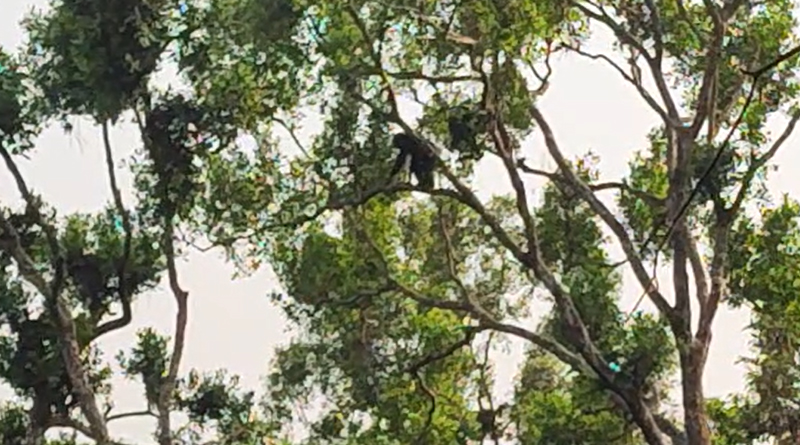TACUGAMA: CHIMPANZEE SANCTUARY, SIERRA LEONE
If you are expecting that a visit to Tacugama Chimpanzee Sanctuary in Freetown, Sierra Leone will include cuddling baby chimps and getting a great selfie with the primates for your Instagram account, you will definitely be disappointed.
Although Tacugama is one of the most visited attractions in the country, its focus is very much on the wellbeing of the chimps, not creating social-media-worthy pics for tourists. Everything is geared around what the resident rescued chimpanzees need. Many have been freed from terrible situations and still bear the emotional and physical scars of their past.
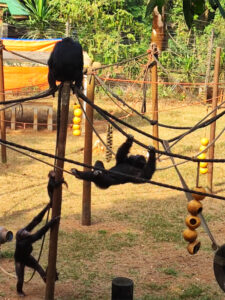
Tacugama was set up by Bala Amarasekaran nearly 30 years ago after he rescued a sickly baby chimp offered for sale in a remote village 150miles north of Freetown. He then discovered that there were over 50 captive chimps in Freetown alone, and wider wild populations of the Western Chimpanzees of Sierra Leone also needed help. Bush meat was very popular, chimps were commonly kept as pets in tiny cages, and killing whole families of chimps was a common occurrence as deforestation increased and the primates came into closer contact with humans. The future didn’t look good. So inspired by the work of leading primatologist Jane Goodall, Bala created Tacugama. From its humble beginnings, and miraculously surviving the civil war that ravaged the country, the Sanctuary now houses around 120 chimpanzees and has extended its work to include education, conservation, and activism.
As a visitor to Sierra Leone a trip to Tacugama is a must. Tours are available most days and last around 90 minutes, but if you’d really like to get a feel for the place and immerse yourself in the Western Area Peninsula National Park then book to stay at one of their rustic eco lodges within the sanctuary. The lodges are brightly painted, each named after a chimp resident of Tacugama. They are surrounded by trees and give you a sense of sleeping in the forest, with the sounds of the birds and the calls of the chimps your constant backdrop. There is a communal area to hang out, called The BBQ, where you can sit, relax, make yourself a coffee, and eat your meals (which can be provided by the team at Tacugama provided you book in advance). Don’t expect luxury, but do expect an authentic experience with the added bonus that your stay is also supporting the important work of protecting these chimpanzees both within Tacugama and further afield across Sierra Leone.
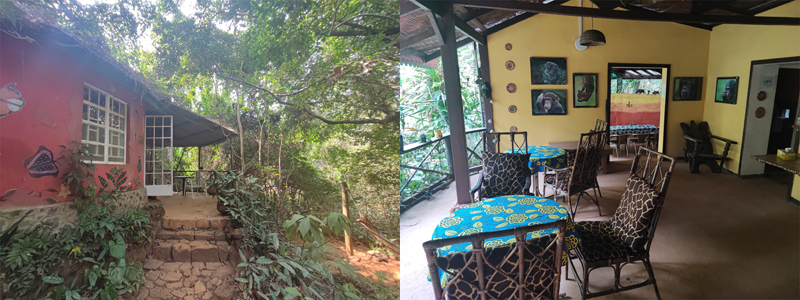
Bala and the team at Tacugama have not satisfied themselves with just rescuing chimps in dire need, they have widened their approach to trying to solve the underlying causes, not just patch up the symptoms. For example, thanks to their campaigning, eating chimps is now illegal, as is keeping them as pets. The team also succeeded in getting the chimpanzee designated the official national animal of Sierra Leone, which has enhanced the status of the primate, increased awareness and led to a sense of national pride in the survival of the chimp.
Although each of these steps is a massive move forward for chimpanzee conservation in the country, the chimpanzees of Sierra Leone are still at risk. Deforestation is continuing at an alarming rate, and the chimps are being squeezed into small and smaller areas, which in turn puts them into conflict with humans who worry they are eating their food. The fight to save the chimpanzees is far from over.
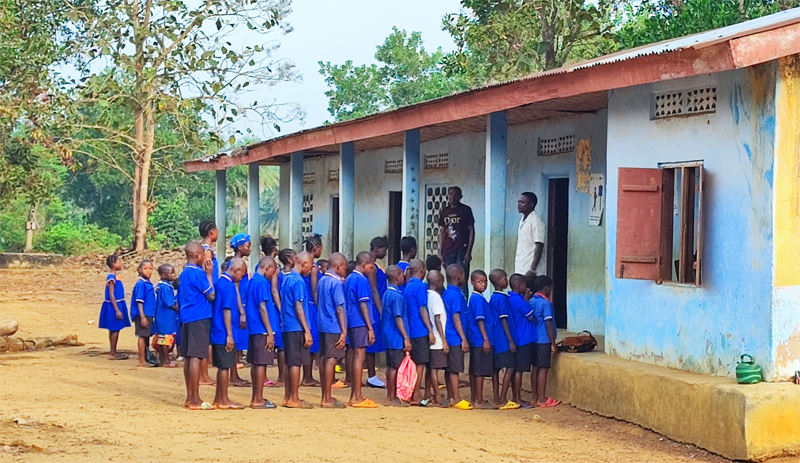
One of the major projects that Tacugama is spearheading in rural areas, especially in the Pujehun District of southern Sierra Leone, is education. By working with, and supporting, local schools they can help improve education overall and ensure that conservation and respect for nature and chimpanzees is taught from an early age.
Improving the education a child receives is a proven way of helping people out of poverty. Tacugama contributes towards laptops, books, and lesson plans as well as other resources. They also pay teachers a stipend. Most teachers are unqualified, and unpaid. They volunteer to teach the children, but this takes them away from other work or growing crops, so a stipend is needed. But even with all this additional help, the schools struggle. Most don’t have enough teachers. For example, we visited schools with three age-group classes but only one teacher. So, while the teacher was instructing one class, the other two classes had to sit and wait. And even where schools do have sufficient teachers many of them are not trained, their teaching skills are lacking and even their own knowledge may not be quite up to the levels needed. There is no doubt everyone is doing the best they can, but there is a long way to go to reach a place where children and teachers are receiving what they need.
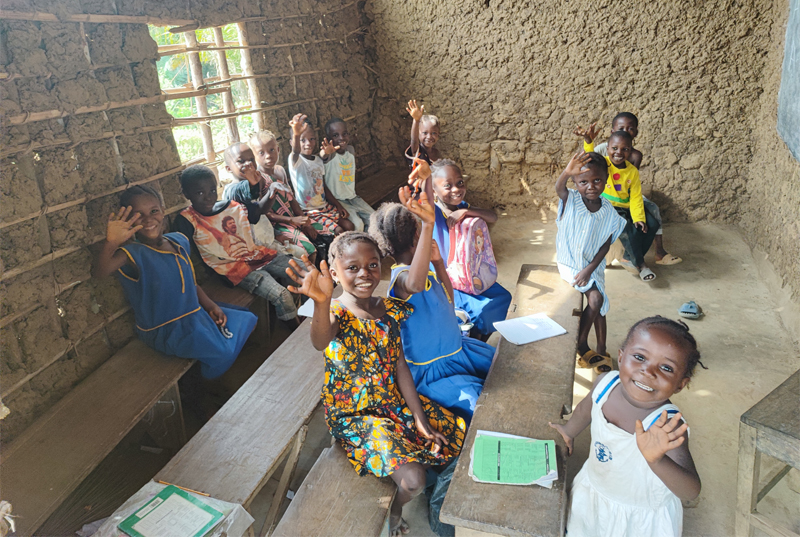
And this is why Tacugama is working to bring more money, in the form of eco-tourism and visitors, to these areas. With additional income, teachers can be trained, schools can have a teacher per classroom, children can have better quality lessons, and can attain a higher standard of education leading to better jobs. It’s a virtuous circle where everyone wins – provided the tourism is positive and does not negatively impact the local environment, wildlife, nature or people.
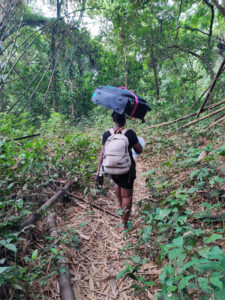
Not far from Kambama village, near the beautiful island of Jaibui, Tacugama is building very low impact eco-lodges. Made from local materials, with power from solar, composting toilets, and an ‘everything in, everything out’ policy, these lodges hope to attract new visitors to the area. This in turn will bring employment to villagers with jobs ranging from carrying luggage (one of the ladies of the village carried our suitcase on her head, navigating winding paths, rickety plank bridges and steep slopes, with the case balanced perfectly, no hands needed, and hardly a wobble in sight) to cooking dinner (I strongly recommend a groundnut stew called Tangajesse. It is bursting with local flavour and served with potatoes and cassava, so it will keep you feeling full).
By helping to bring visitors, and therefore money, to the area, Tacugama hopes that people will begin to understand that they can earn a living by protecting chimps and their habitats. In other words, these animals are worth more alive than dead.
There is a long way to go, but a genuine, tangible start has been made. And every great vision has it’s first steps. Sierra Leone is a beautiful country, with much to offer the foreign visitor. It may still be a little rough around the edges, and more suited to pioneers of travel than those looking for a luxury western-style experience, but that doesn’t mean it should be ignored. If you want to experience a country before the hordes arrive, then now is the time to visit Sierra Leone.
FOR MORE INFORMATION
Tacugama – https://www.tacugama.com/
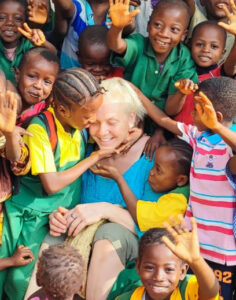 ABOUT THE AUTHOR
ABOUT THE AUTHOR
Chantal Cooke is an award-winning journalist and broadcaster and co-founder of PASSION for the PLANET.
Chantal is passionate about tourism being used as a force for good.
You can follow her adventures on Facebook and Twitter @chantalcooke and on Instagram @Chantaldcooke

